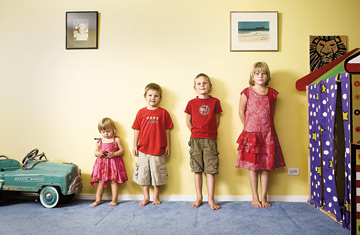
From left, the siblings of the Christory family - Elize (20mos.), Emeil (5), Arthur (6) and Saline (8).
(4 of 4)
The sheer number of siblings in a family can also trump birth order. The 1% income difference that Black detected from child to child tends to flatten out as you move down the age line, with a smaller earnings gap between a third and fourth child than between a second and third. The IQ-boosting power of tutoring, meanwhile, may actually have less influence in small families, with parents of just two or three kids doing most of the teaching, than in the six- or eight-child family, in which the eldest sibs have to pitch in more. Since the Norwegian IQ study rests on the tutoring effect, those findings may be open to question. "The good birth-order studies will control for family size," says Bo Cleveland, associate professor of human development and family studies at Penn State University. "Sometimes that makes the birth-order effect go away; sometimes it doesn't."
The most vocal detractors of birth-order research question less the findings of the science than the methods. To achieve any kind of statistical significance, investigators must assemble large samples of families and look for patterns among them. But families are very different things--distinguished by size, income, hometown, education, religion, ethnicity and more. Throw enough random factors like those into the mix, and the results you get may be nothing more than interesting junk.
The alternative is what investigators call the in-family studies, a much more pointillist process, requiring an exhaustive look at a single family, comparing every child with every other child and then repeating the process again and again with hundreds of other families. Eventually, you may find threads that link them all. "I would throw out all the between-family studies," says Cleveland. "The proof is in the in-family design."
Ultimately, of course, the birth-order debate will never be entirely settled. Family studies and the statistics they yield are cold and precise things, parsing human behavior down to decimal points and margins of error. But families are a good deal sloppier than that, a mishmash of competing needs and moods and clashing emotions, better understood by the people in the thick of them than by anyone standing outside. Yet millenniums of families would swear by the power of birth order to shape the adults we eventually become. Science may yet overturn the whole theory, but for now, the smart money says otherwise.
